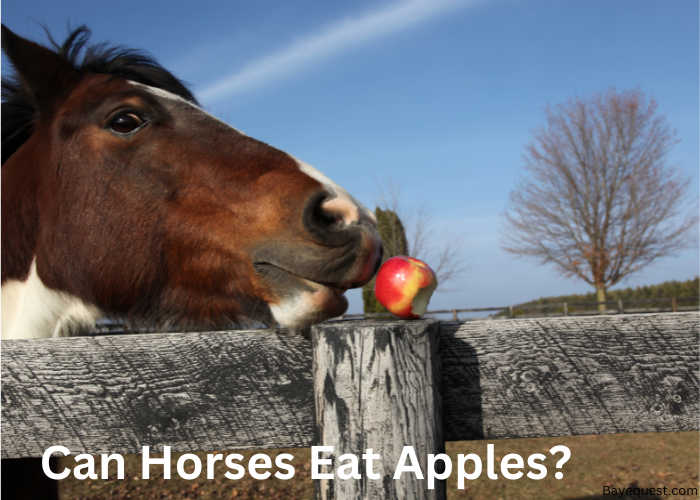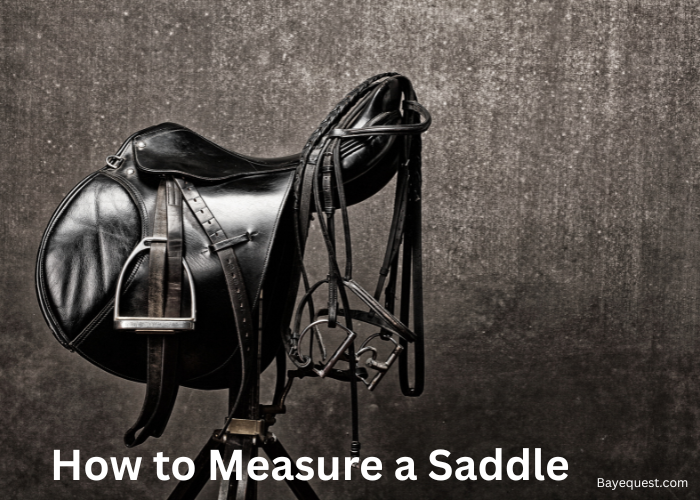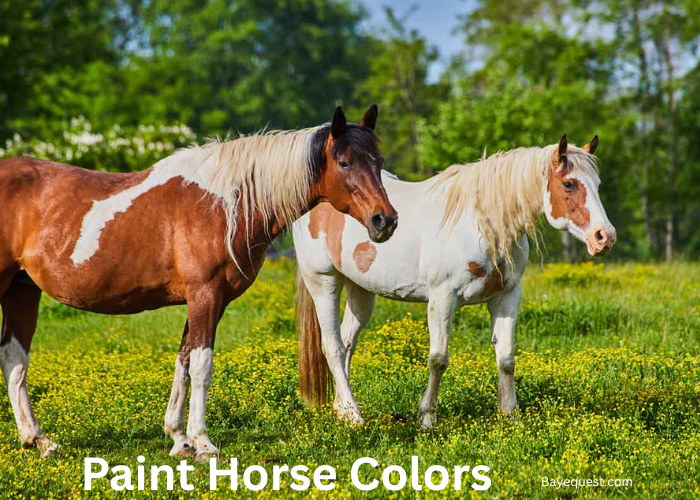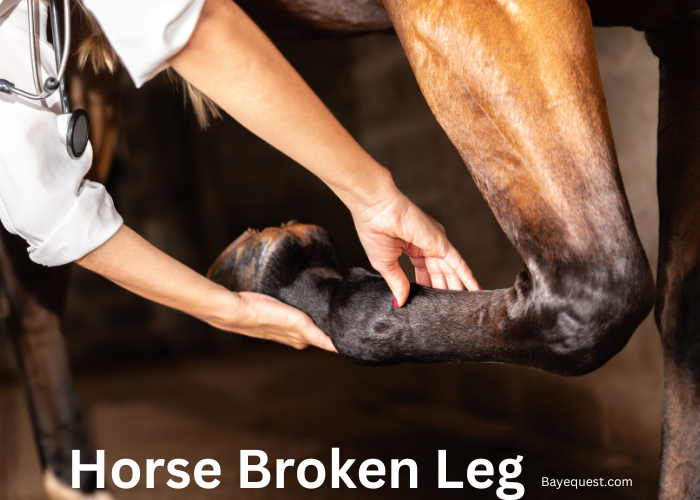Horses and apples seem like the perfect match. You’ve seen it in movies, at barns, and maybe even tried it yourself.
But is it really safe to feed apples to your horse? They love the crunch and sweetness, but there’s more to consider.
Too many apples or feeding them the wrong way could lead to problems.
Before making apples a regular treat, it’s important to understand the risks and benefits. Let’s break down what you need to know to keep your horse happy and healthy.
Can Horses Eat Apples? Key Takeaway
Yes, horses can eat apples, but only in moderation. Apples are a healthy treat packed with fiber and vitamins. Cut them into small pieces to avoid choking and remove the seeds. Too many apples can cause digestive issues. Feed apples as an occasional treat to keep your horse happy and healthy.
Should Horses Eat Apples?
Yes, horses can eat apples. Apples are a tasty, nutritious treat packed with fiber and vitamins that can benefit your horse in small amounts.
However, there are some important considerations. Feeding too many apples can lead to digestive issues or even colic. They can also pose a choking risk if not prepared properly.
While apples are safe for most horses, moderation and proper preparation are key. Always slice them up and keep an eye on how your horse reacts to ensure a happy and healthy snack time.
Are Apples Safe for Horses?
Yes, apples are safe for horses when given in moderation. They provide essential vitamins and fiber, making them a healthy treat.
However, too many apples can lead to digestive problems like colic and diarrhea. Cut the apples into smaller pieces to prevent choking.
While apples are a safe choice, they should be an occasional treat, not a regular part of a horse’s diet. Always monitor your horse’s reaction to new treats to ensure they enjoy them safely.
Can Horses Eat Apple Cores?
Horses can eat apple cores, but it’s not always the best idea. While the flesh of the apple is safe, the seeds contain small amounts of cyanide, which isn’t ideal for horses if consumed in large quantities.
The core can also be tough and pose a choking hazard, especially for smaller horses or those who don’t chew thoroughly.
Always remove the core and seeds before offering apples as a treat. By doing so, you ensure your horse enjoys the snack without any risks.
Can Horses Eat Apple Seeds?
No, horses should not eat apple seeds. Apple seeds contain amygdalin, a compound that releases cyanide when digested.
While a few seeds won’t harm a horse, consuming them in large quantities could pose a health risk. It’s always better to be safe and remove the seeds before feeding apples to your horse.
This simple step helps avoid potential toxicity and ensures that apples remain a healthy and enjoyable treat.
Can Horses Be Allergic to Apples?
Yes, horses can be allergic to apples, though it’s quite rare. An allergic reaction might show up as hives, itching, difficulty breathing, or digestive upset like colic or diarrhea.
If you’re introducing apples to a horse for the first time, start with a small amount and watch for any signs of an allergic reaction.
If you notice any unusual symptoms, stop feeding apples and consult your vet. Each horse is different, and what works for one might not work for another.
How Many Apples Can a Horse Eat a Day?
A horse should eat no more than one to two apples a day. While apples are a tasty and nutritious treat, too many can lead to digestive issues.
Horses have sensitive stomachs, and moderation is key. As with any treat, apples should complement a horse’s regular diet, not replace it.
Always monitor your horse’s reaction and adjust the amount accordingly to keep them healthy and happy.
Nutritional Benefits of Apples for Horses
Apples offer several nutritional benefits for horses when fed in moderation. Some of these benefits include:
Fiber. Apples provide a good amount of dietary fiber, which aids in digestion and promotes healthy gut function in horses. Fiber helps in maintaining a balanced digestive system and preventing issues like colic.
Vitamins and antioxidants. Apples are packed with vitamins C and A. Vitamin C acts as an antioxidant while vitamin A is essential for vision and proper immune function.
Hydration support. Apples have a high water content, which can help in keeping horses hydrated, especially during hot weather or after exercise.
Low in calories. Apples are low in calories, making them a suitable occasional treat without adding excessive sugar or calories to a horse’s diet.
Natural sugars for energy. The natural sugars in apples provide a quick energy boost, making them a great reward after a workout or training session.
How To Safely Feed Your Horse Apples
To safely feed your horse apples, follow these steps:
Wash the apples. Rinse the apples well to remove any dirt, pesticides, or chemicals that could be harmful.
Cut into small pieces. Slice the apples into smaller pieces or wedges. This reduces the risk of choking, especially for horses that tend to gulp down treats.
Remove seeds and core. Take out the seeds and core. Apple seeds contain amygdalin, which can release cyanide when chewed, and the core can pose a choking hazard.
Start with small amounts. If it’s your horse’s first time eating apples, start with just a few pieces. Monitor for any signs of allergies or digestive upset.
Feed as an occasional treat. Limit apples to one or two per day. They should be a treat, not a replacement for their regular feed.
Observe your horse. Keep an eye on your horse while they eat. If they show any signs of choking, discomfort, or allergic reactions, stop feeding immediately and consult a vet.
Nutritional Composition of Apples
| Nutrient | Composition (per 100g of Apple) | Importance for Horses |
| Water | 85.6 g | Helps with hydration, especially in hot weather. |
| Fiber | 2.4 g | Aids in digestion and helps prevent digestive issues like colic. |
| Vitamin C | 4.6 mg | Acts as an antioxidant, boosting the immune system. |
| Vitamin A | 54 IU | Supports vision, skin health, and immune function. |
| Potassium | 107 mg | Helps regulate fluid balance, muscle function, and nerve signals. |
| Carbohydrates | 13.8 g | Provides a quick source of energy from natural sugars. |
| Sugars | 10.4 g | Offers a natural energy boost; should be limited to avoid excessive sugar intake. |
| Potassium | 6 mg | Essential for bone health and muscle function. |
| Magnesium | 5 mg | Supports muscle and nerve function, as well as energy production. |
| Phosphorus | 11 mg | Important for bone health and energy metabolism. |
Potential Risks of Feeding Apples to Horses
Feeding apples to horses can be a delightful treat, but there are some potential risks to be aware of:
Choking hazard. Apples, especially whole or large pieces, can pose a choking risk. Horses that don’t chew thoroughly or gulp their food might choke on chunks of apple.
Digestive issues. Overfeeding apples can lead to digestive problems like colic, gas, or diarrhea. Horses have sensitive digestive systems, and too much sugar or fiber can cause discomfort.
Cyanide in seeds. Apple seeds contain amygdalin, which releases cyanide when chewed. While a few seeds are unlikely to cause harm, regular consumption in large quantities can be toxic.
Blood sugar spikes. Apples contain natural sugars that can lead to spikes in blood sugar, which might be a concern for horses with insulin resistance or metabolic disorders.
Allergic reactions. Though rare, some horses can be allergic to apples, leading to symptoms like itching, hives, or digestive upset.
Dental issues. Feeding too many apples or other sugary treats can contribute to dental problems like tooth decay.
Fermentation in the stomach. If a horse eats too many apples at once, the excess sugar can ferment in the stomach, leading to colic or other digestive issues.
What Other Fruits Can Horses Eat?
Horses can enjoy a variety of fruits as occasional treats, each offering unique nutritional benefits. Here’s a breakdown of some fruits that are safe for horses:
1. Grapes. Horses can safely eat grapes, which are small, easy to chew, and packed with antioxidants and vitamins. However, feed in moderation to avoid excess sugar intake.
2. Plums. Horses can eat plums, but only if the pit is removed. The flesh of plums provides vitamins and fiber, but the pits contain cyanogenic compounds that can be toxic.
3. Blueberries. These small berries are rich in antioxidants, vitamins C and K, and fiber. They are a great low-calorie treat and can be fed in small handfuls.
4. Pears. Like apples, pears are a good source of fiber and vitamins. However, remove the seeds and core before feeding, as they can pose a choking hazard and contain small amounts of toxins.
5. Watermelon. Horses can eat both the flesh and the rind of watermelon. It’s hydrating and provides vitamins A and C. Cut it into manageable pieces to avoid choking.
6. Bananas. Bananas are rich in potassium and provide a good energy boost. Horses can eat both the flesh and the peel, although some may prefer one over the other. Offer in slices for easy eating.
Related read: What Horses Should Not Eat.
Conclusion
Apples can be a crunchy, juicy treat for your horse, but like anything good, they need a bit of balance.
A slice here and there brings joy and some healthy perks. Too many, though, can stir up trouble.
So, keep it simple—cut them up, keep the seeds out, and watch for any signs that don’t feel right. Apples are a yes, but a thoughtful yes.
When done right, you and your horse can enjoy those sweet, crisp moments without worry in the world.








